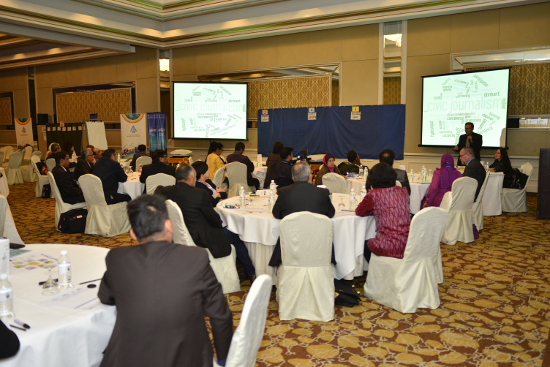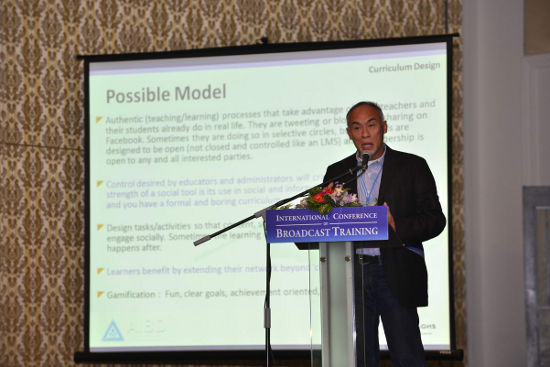Day 2 – Friday, 6th February 2015, 0900 – 1030
Session 4: Technological Innovations and Trends Impacting Creative Content Production
This session will explore the range, and nature of technological changes, including ICT innovations influencing creative content production. It will describe some best practices of using information processing capabilities, repackaging of user-generated content and provision of easy-to-use platforms to enable audiences to exercise their creativity and innovativeness. In particular, it will look at case studies that highlight the impact of innovative trends in the ICT sector on creative content.
Day 2 – Friday, 6th February 2015, 0900 – 1030
Session 4: Technological Innovations and Trends Impacting Creative Content Production
This session will explore the range, and nature of technological changes, including ICT innovations influencing creative content production. It will describe some best practices of using information processing capabilities, repackaging of user-generated content and provision of easy-to-use platforms to enable audiences to exercise their creativity and innovativeness. In particular, it will look at case studies that highlight the impact of innovative trends in the ICT sector on creative content.
Moderator |
|
 |
Mr. Steve Ahern Managing Director, Ahern Media & Training Pty Ltd, Australia |
Speakers |
|
 |
Mr. Jeewa a/l Vengadasalam Specialist II, Lee Kong Chian Faculty of Engineering and Science, Department of Electrical and Electronic Engineering, Universiti Tunku Abdul Rahman, Malaysia |
 |
Mr. II George Additional Director General (Training), National Academy of Broadcasting and Multimedia (NABM), India |
 |
Mr. Kabul Budiono |
ICBT : Session 4: Technological Innovations and Trends Impacting Creative Content Production
Day 2 - Friday, 6th February 2015, 0900 - 1030
Session 4: Technological Innovations and Trends Impacting Creative Content Production
This session will explore the range, and nature of technological changes, including ICT innovations influencing creative content production. It will describe some best practices of using information processing capabilities, repackaging of user-generated content and provision of easy-to-use platforms to enable audiences to exercise their creativity and innovativeness. In particular, it will look at case studies that highlight the impact of innovative trends in the ICT sector on creative content.
ICBT : Session 3: Creative Content for a Global Audience
Day 1 - Thursday, 5th February 2015, 1600 - 1730
Session 3: Creative Content for a Global Audience
This hands-on, interactive session will involve all participants in a creative content storytelling exercise. It is critical to have good storytelling dedicated to harnessing creativity, integrity, and imagination for serving local and global audiences. It will discuss critical components of a good story that attracts changing and demanding broadcast viewers provide best practices for effective storytelling across all platforms. It will seek to answer the question: Is there such a thing as a universally interesting and universally compelling story?
ICBT : Session 2: Shifting Audience Preferences and Behaviours
Day 1 - Thursday, 5th February 2015, 1400 - 1530
Session 2: Shifting Audience Preferences and Behaviours
Changing audience profiles and behaviour have had a significant impact in terms of content creation and distribution. It requires broadcasters to examine the demands of audiences to determine what content they want to consume and on what platforms they want to consume it. The reality of multi-platform simultaneous consumption (multi-tasking) means audiences are consuming and participating simultaneously. How do content creators meet these new audience demands? How can they use trends in social media to their advantage in crafting content?
ICBT : Session 1: The Future of Broadcasting Depends on Today’s Creative Content
Day 1 - Thursday, 5th February 2015, 1100 - 1230
Session 1: The Future of Broadcasting Depends on Today's Creavite Content
The session will look at the current state of creative content in the broadcast industry and outline the multidimensional aspects of creative content today. It will also identify the key players in creative content production, including new actors who are engaged in online content aggregation, distribution and branding. What are the roles of multi platform, crowd sourced, crowd funded audience interactive and collaborative forms of content? What are the essential economic, competitive, technological and social forces that are driving the evolution of creative content?
ICBT : Inaugural Session
Day 1 - Thursday, 5th February 2015, 1000 - 1030
Inaugural Session and Keynote Address
IPPTAR/KKMM/AIBD 3rd International Conference on Broadcast Training
The 3rd International Conference on Broadcast Training, hosted by the Ministry of Communications and Multimedia, Malaysia (KKMM) and organised by the Tun Abdul Razak Broadcasting and Information Institute (IPPTAR) and AIBD will be held on 5-6 February 2015 in Kuala Lumpur, Malaysia.
Calls for More Value-Driven Training
AIBD Director Yang Binyuan has strongly urged broadcasters to move away from a business as usual attitude and adapt to the challenges and opportunities posed by social media and the emerging media platforms.
Training Approaches in the New Media Environment
For broadcast training institutions to be attuned and responsive to the demands of new media and social media, they need to form task forces that will facilitate exchange of trainers and experts, offer a more modularized and interactive type of training curriculum relevant to broadcasters’ needs and establish a web-based management protocol or a ‘brokerage’ of sort that facilitates generation of training data and regional exchanges and collaboration.
Need for a Responsive Training Curriculum
Mr. Steve Ahern, CEO of International Media & Broadcasting Academy (IMBA), Australia has called for a restructuring of the training curriculum for broadcasters, one that is based on new technology, audience consumption trends and workflow.
Effective Curriculum Models for Social Media Training
Any effective curriculum models for social media-based training must start with the audience and an understanding of what motivates them towards social media and related interactions.






